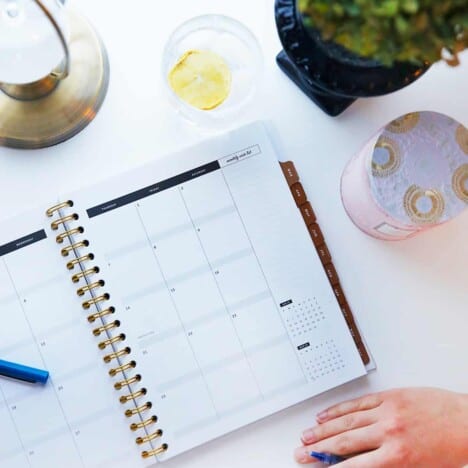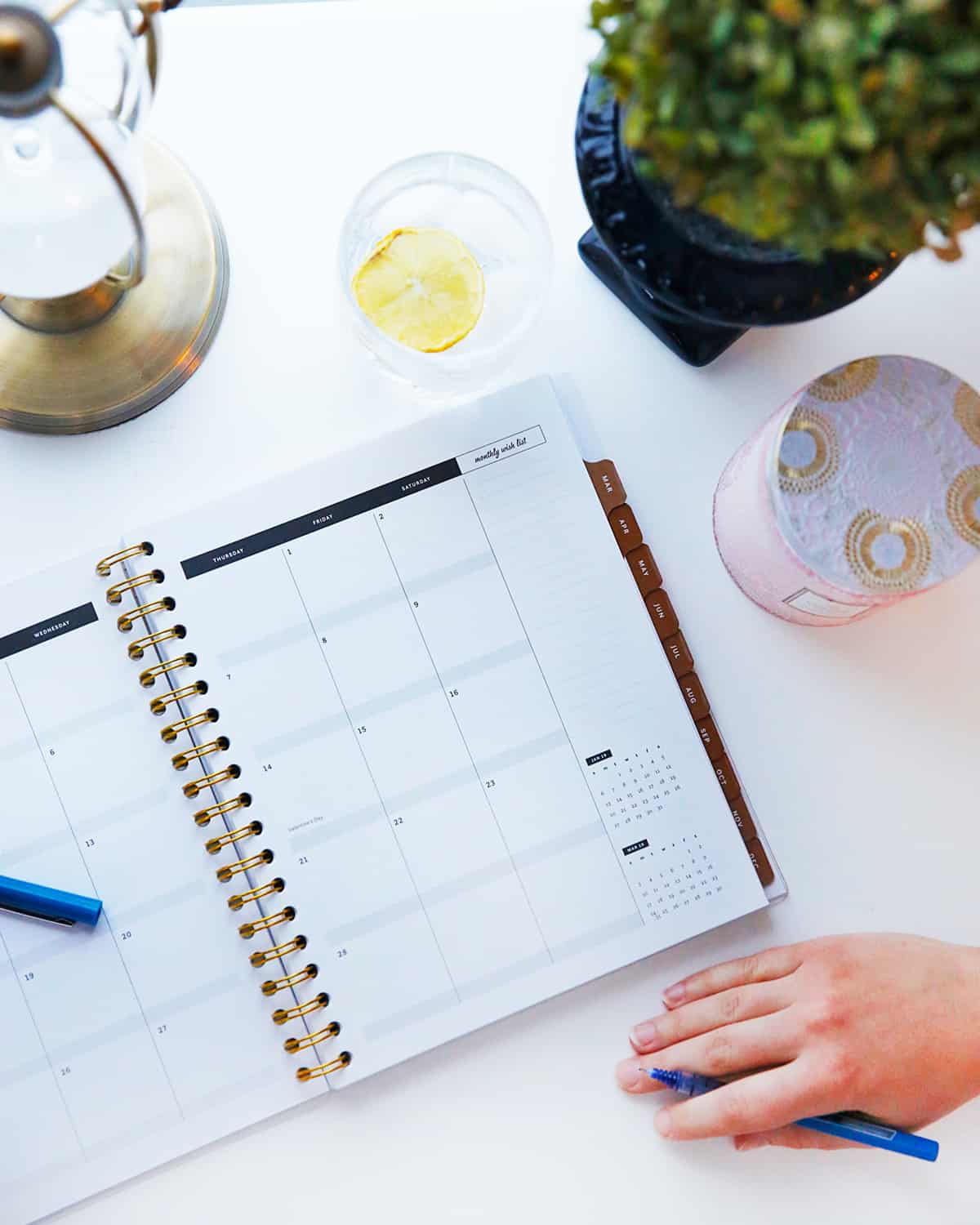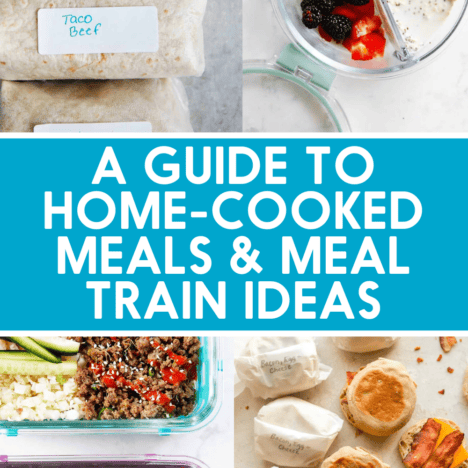This post may contain affiliate links. Please read my disclosure policy.
Remember those goals and intentions you made way back in the new year? Did any of them stick? It can be so easy and exciting to create new goals for yourself, but where it gets difficult is maintaining healthy habits that can last a lifetime. Creating healthy habits for yourself (and your family) and making them a part of your lifestyle is not only good for your health, but also important for your self-esteem and confidence.
But first, what healthy habits are we talking about? We’re talking about the ones that generally make us feel like our best self. These include:
- Nourishing your body with good-for-you food. What the definition of that is up to you to decide. But either way, you should make finding out what foods make you feel the best and give you the most energy a priority.
- Moving your body: Exercise has more to do with moving your body to increase the feel good endorphins than it has to do with losing weight. Every body benefits from exercise and it builds confidence.
- Finding balance in your life. It’s so easy to run yourself ragged in this busy life, but finding balance is key to creating a healthy life.
 13 Tips to Help You Maintain Healthy Habits
13 Tips to Help You Maintain Healthy Habits
After reaching out to our readers on social media we asked: “What is your biggest hurdle to maintaining a healthier lifestyle?” and so many of you responded with similar struggles: not having enough time, difficulty keeping up with exercise goals and staying on track with good-for-you food choices. We’re going to try to break it down and give you our best 13 Tips to Help You Maintain Healthy Habits that last a lifetime.
1. Be kind to yourself and celebrate your victories. This is the most important tip we can offer. Beating yourself up over your perceived “failure” is absolutely no way to maintain any type of habit except the habit of negativity. Celebrating what you have achieved, no matter how small!
2. Make a plan. Write down what it is you want to achieve and break it down into really simple tangible goals. Just thinking “I want to eat healthier” is not enough. Get specific with your goals. If it is to “eat healthier” write down the foods you want to eat and even why it is you want to eat them. If you are looking for more balance in your life write down what time of the day you want to stop all work related activity so you can truly focus on other parts of your life.
3. Just get started. Now. Take any possible small step you can towards your goal. If your goal is to get to the gym in the day, put your gym clothes on! You are now one step closer to getting there. If your goal is to eat more vegetables pack some cucumber sticks with you at the start of the day. Don’t wait for tomorrow to start. Do it as soon as you possibly can with the smallest step you can manage if that is where you are it.
4. Try to accomplish less. This may seem counterintuitive but stick with us. Your plate can only handle so much, figure out what fits on yours and get rid of the rest. This applies to not only your health goals but also other areas of your life. If your health goals are meditating, starting a workout routine, getting dinner on the table, making time for friends, and ten other things, it’s unlikely you’ll succeed. Say no as often as you can for things that don’t accomplish your true health priorities. Stop being so busy and to try to be more productive with what is important. You don’t have to do it all! Pick 1-3 things you can do each day that pushes you closer to your bigger goal: that can be as simple as getting a healthy meal on the table.
5. Focus on the habit, not the result.When we think about healthy habits it is usually attached to a result (such as losing weight or getting 8 solid hours of sleep). Instead try to focus on the habit itself that will get you to your goal. Just “show up” with what it is you need to do and make that a habit first, and then work out the rest of the details later about how to get to your goal.
6. Make sleep a priority. Chronic fatigue can lead to poor health, poor choices and just generally not have the energy to do what you want or need. Set yourself a bedtime and stick to it. Use apps and timers and technology to make sure you get enough sleep.
7. Stress management. Everybody knows this but it’s worth putting on this list. You have to find a way to keep stress down as that can affect your health and the ability to make good choices for yourself. Use mediation or breathing apps to help you slow down throughout the day, say no as often as you can (see #4) to the things that don’t accomplish your big goals and yes to the things as often as you can that make you happy and less stressed. Ask yourself what those things are and start to pay attention to them.
8. Moderation. We’re all about this one. Don’t set yourself up for failure by being overly ambitious or having unrealistic goals. If you’ve set a goal for going to the gym 5 days a week, and previously you only went 1 (or zero) days a week, that’s a lofty jump. So be realistic, be easy on yourself, and remember that more isn’t always better. If your goals or intentions feel overly restrictive, it’s going to be harder to accomplish.
9. Surround yourself with people who encourage your goals. Try to build up the positivity in your life, because negativity is contagious. Tell who you are comfortable with about your new lifestyle habits so they can help keep you accountable, or even better join in with you!
10. Lead by example. Healthy habits are contagious. If your family isn’t on board at first, you have to be the one to start. It can be so hard if you are the only one doing it, but look at it like you are the one that is going to lead the path to contagious healthy habits for not only yourself but the rest of your family. Just like taking on bad habits can be contagious, so can catching good ones. For kids, get them involved with choosing and cooking healthy meals and making movement a fun family activity as much as possible.
11. Meal prep. Whether you are happy with your current food habits or not, making a plan for meals is key to balancing life! Do some planning and prepping that won’t keep you overwhelmed in the kitchen for 6 hours on a Sunday, but do-able so you can have items in the house ready to go. If you don’t have as much time to cook look into healthier prepared ingredients that make dinner a snap, such as: jarred pasta sauce, frozen meatballs and prepared zucchini noodles. Plan out the week and think about leftovers for lunch, what you already have in the freezer, and more. Download this weekly menu planner we created to get organized! Try to plan one week ahead so you just have to go to the store once, or use grocery delivery to check that chore off your list.
12. Have a back up plan. Always have an emergency back up of some time of food or snack that is good for you in case all else fails and your stuck on a dessert island with nothing to eat. But seriously! Stash an energy bar or other shelf stable snack in your purse or work bag at all times. Some ideas: nuts, trail mix, jerky, dried fruit, nut butter packs.
13. Learn how to swerve. Pay attention to how you feel and change directions if you need to. Are you overwhelmed? Do the habits fit with your lifestyle? Is it easy to maintain your new habit without severely impacting other areas of your life? If you find that you haven’t kept up with your new plans as you’ve hoped, don’t get upset! Acknowledge and give yourself some love for even noticing and having the awareness that you need to reevaluate your plan of action!


 13 Tips to Help You Maintain Healthy Habits
13 Tips to Help You Maintain Healthy Habits




I love the planner in the blog photo! What brand is that?
Nourished Planner!!! https://nourishedplanner.com